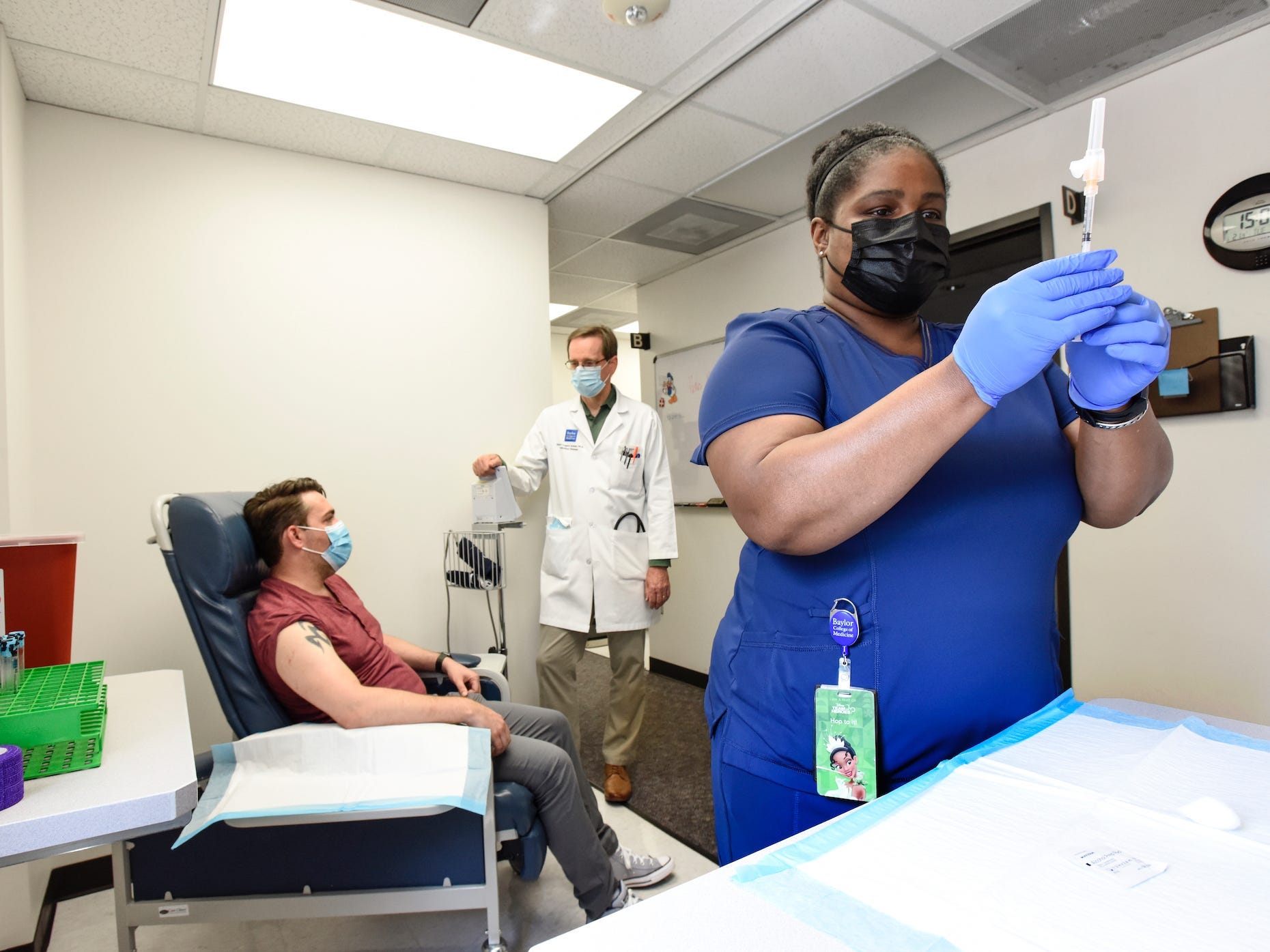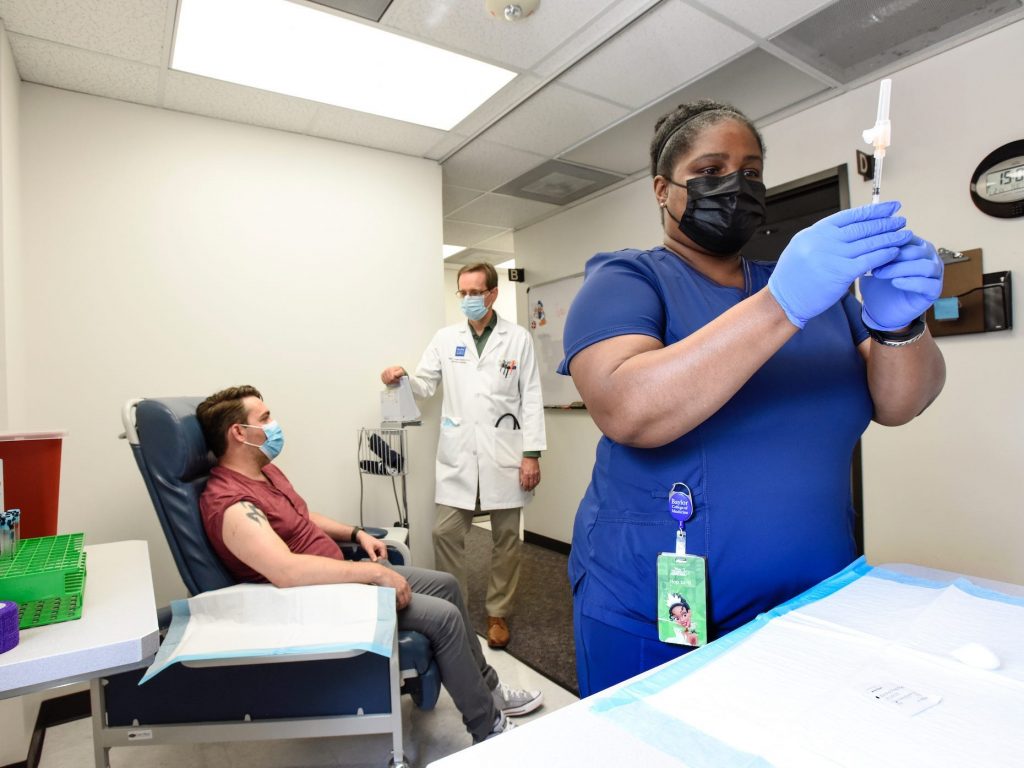
Baylor College of Medicine
- Fully vaccinated Americans will soon be offered extra doses of different COVID-19 vaccines.
- This is known as a "mix and match" booster shot strategy.
- Here's what we know about the benefits of mix and match booster shots so far.
Americans will soon be able to get so-called "mix and match" boosters – an extra COVID-19 shot that's different to the vaccine they originally received.
On Wednesday evening, the US Food and Drug Administration (FDA) authorized mix-and-match booster shots for people in the US who originally got Johnson & Johnson's single dose vaccine, and for older adults and vulnerable people who had Moderna's vaccine.
Pending a final green light from the Centers for Disease Control and Prevention (CDC), eligible Americans vaccinated with Pfizer and Moderna's vaccines will soon be able to get a shot of any FDA-authorized vaccine booster after six months. People who got J&J's vaccine will be able to have one after two months.
This followed an influential US trial that suggested boosting with different vaccines was safe and effective.
Before, only immunocompromised patients, as well as vulnerable populations and older adults who'd had Pfizer vaccines, were eligible for boosters.
Mix-and-match boosters haven't been extensively tested in the real world - but there are lots of reasons why they're a good idea, experts say.
The reasons for the decision
In theory, different vaccines can stimulate the immune system in different ways, so giving people mix-and-match booster shots could produce a better immune response than an extra dose of the same vaccine.
"You'll reach a part of the immune system not reached as well by the initial vaccine," Dr. Robert Atmar, one of the principal investigators of the ongoing mix-and-match booster trial at Baylor College of Medicine, told Insider of the idea.
Some vaccines may be better at producing an antibody response, for example, while others might be better at stimulating white-blood cells called T cells and B cells to protect us.
But this was "really a theoretical potential benefit" that's largely been seen "in the test tube," he said.
The main reason the US is allowing mixing and matching is, for now, practical rather than scientific. It's "really a public health question, in terms of ease of administration and distribution," Atmar said.
Some vaccines are simply more readily available than others - not every pharmacy or doctor's office carries all three vaccine brands.
Mix and match will help if one manufacturer has a problem, Pedro Piedra, professor of molecular virology, microbiology, and pediatrics at Baylor College of Medicine in Houston, told National Geographic.
The data on mix-and-match booster shots
In the UK, adults over 50 or at risk of severe COVID-19 have been able to get a mix-and-match booster since September 14. This decision was mostly based on early data from an ongoing UK-based trial, COV-Boost, which is not publicly available.
The National Institute for Health Research, which funded the study, said at the time that the trial showed mixed booster doses of COVID-19 vaccines given to fully vaccinated people provided a "substantial increase in vaccine-induced immune responses."
The preference is for Brits to get Pfizer, regardless of what vaccine they had before, but a half-dose of Moderna is also available.
The US published its first landmark booster trial on October 13, which showed giving people who'd received J&J's one-shot vaccine a separate dose of any FDA-approved vaccine boosted their antibodies, without any serious side effects.
In the trial, a second dose of J&J's shot boosted people's antibodies four fold, while switching to a shot of Pfizer or Moderna boosted antibodies 35 and 75 fold, respectively. This could suggest mixing and matching provided more protection - but antibodies aren't a perfect measure of overall immune protection.
"The study really was not designed" for direct comparisons, Atmar said. Regardless of what a person received originally, getting one of the three booster shots "led to good antibody responses," he said.
Real-world results aren't yet known
But it's unclear what the true effect of mixing and matching will be because real-world data is scarce.
Dan Barouch, director of the Center for Virology and Vaccine Research at Boston's Beth Israel Deaconess Medical Center, told National Geographic that every combination should be specifically studied for safety and immune response. Even vaccines that use the same technology aren't identical, which could affect how a mix and match booster dose works, he said.
For example, Moderna and Pfizer's vaccines both use a genetic code to teach the body to make part of the virus to trigger an immune response, but they vary in multiple ways including dose, dosing interval, and the genetic sequence they use.
Atmar agrees you'd test all combinations "in a perfect world," but that it wasn't "feasible" in the US to, for example, study "boosters in persons who had gotten AstraZeneca, or who had gotten the Chinese vaccine, or the Sputnik vaccine."
Mix-and-match alone can't end pandemic
At the least, mixing and matching gives us options. In places where the same brand of booster isn't available, people can just take what's on offer.
But no matter how effective they are, the extra protection won't be enough to end the pandemic, vaccine experts say.
"The effect of a booster is much less than the effect of vaccinating unvaccinated individuals - and that means both here and abroad," Dr. Eric Rubin, who sits on the independent vaccine advisory committee to the FDA, said last week.
"If we're going to get out of this thing, we have to be vaccinating the unvaccinated," he said.
